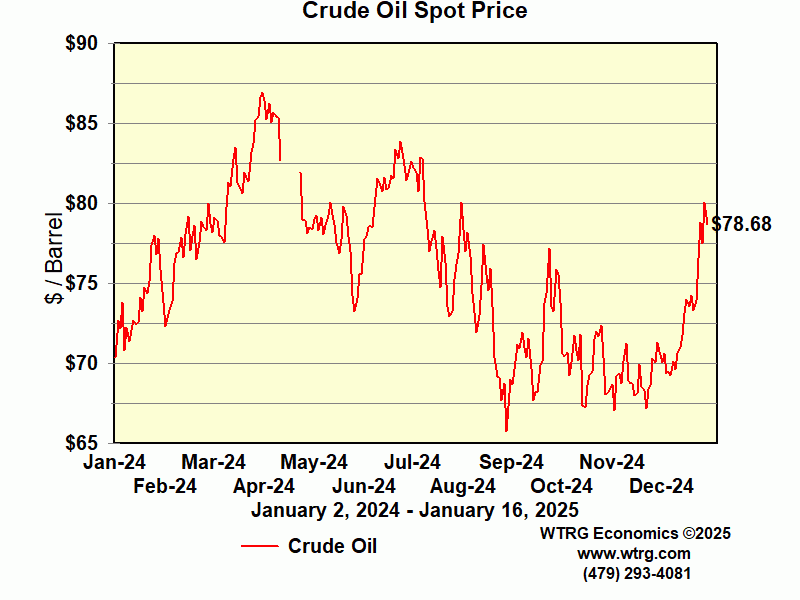Excellent. Yet as usual, I'm left wondering how the Dow is indicative of a "good economy".
Market indices are predicated on nothing other than prices of stocks, and prices of stocks are only indirectly related to actual corporate earnings. Oversimplified, the price of a single share of a company's stock = net earnings per share (times) a market multiple. Market multiples are based on the collective estimations of the millions of people who trade a particular company's stock every day, and can be based on anything from a fund manager's careful analysis of the company's market position and future earnings to the random musings of a granny with a savings account and a dartboard.
Market valuations are based on a combination of rational and irrational expectation, are by nature arbitrary, and are the weakest possible indicators of the state of an economy.
Indeed. But it's not like we have the Bush administration for that. We can thank the plummeting price of crude oil. Spot prices for crude is now hovering just above $50/bbl versus $78 just a few months ago.

Not to mention that trade balance is an inherently "long" indicator. The nature of the recording of corporate shipments and the annual purchasing calendar renders month-to-month comparisons fairly meaningless. Annual (or year-on-year comparison of semiannual) trends are much more meaningful.
And by the way, how
is that annual trend going? From the linked article:
Canadian Business Online wrote:
The overall deficit for 2006 is running at an annual rate of $765.4 billion, putting the country on track to see a record imbalance for the fifth consecutive year. The deficit for all of 2005 was $716.7 billion.
A five year trend, versus a three-month blip. You can decide for yourself what's more meaningful. To me, it sounds less than rosy.
Excellent.
A single day of FX traders jumping at the chance to react positively to the trade balance data.
That versus the dollar's slow freefall over the past 12 months.

Construction of new homes up 4.5% in December. Good news, definitely.
Excellent news.
They're comparing YTD vs YTD 2005. So the amount that the government overspent for the past 3 months was less than the amount that they overspent for the same period last year. HUZZAH. Was it due to a seachange fundamental shift in fiscal policy? Nope - it was a surprise windfall in tax revenues.
As I've said elsewhere, it's a matter of course that the federal deficit will come down over the next year. It's thanks to a new Congressional program called "Aunt Pelosi takes away all the blank checks Little Georgie was getting from Coach Hastert".
Kmarion wrote:
It's pretty easy to see how all of these factors are intertwined.
Please, consider me a layman when it comes to these matters and let me know exactly how these factors are intertwined?
Kmarion wrote:
The point is it seems the economy only hits the mainstream media when the outlook is grim.(In the states that is)
Yet, a quick
google news search for articles mentioning both "economy" and "reuters" brings up a ton of positive articles carried by well-known newspapers across the country. I'm sure I'd get the same results if I bothered to search for other feeds as well. CBS News has a ton of glowingly positive articles up right now. I don't buy this "the media only writes about the negative stuff" wingeing - clearly, the MSM reporters are doing their jobs and reporting the news.
It's not hard to look for positive things that the press is reporting:
"House Democrats finish '100 hours' agenda by passing oil revenue bill"Or negative things that they are not reporting:
"Bush is the first president ever not to raise taxes during wartime, thereby contributing massively to the national debt and conveniently forcing our children and grandchildren to pay off the massive bill, not to mention accrued interest"
